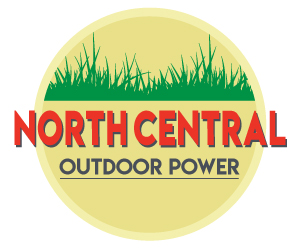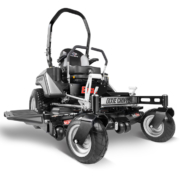Zero turn mowers have been used by professional landscape contractors for many years to produce a manicured-looking lawn in the most efficient way possible.
Lawn Tractors vs. Zero Turns The term “zero turn” refers to the turning radius of the machine being zero inches, or a zero-degree turn radius. This means the zero turn mower can turn within its own footprint. When looking at a lawn tractor and a zero turn side-by-side, some of the differences are obvious. The zero turn mower does not use a traditional steering wheel or pedal brake and the seat is mounted in a lower position. The main difference between a zero turn mower and a steering wheel lawn tractor is in the controls. Each rear wheel has an independent wheel motor (one on the right and one on the left) that is controlled by the two steering handles.
1. Mowing Pattern
When all things are equal, a zero turn mower will allow you to cut a property more efficiently due to the ability to turn 180 degrees at the end of a mowing row. The wider turning radius of a tractor leaves strips of uncut grass that requires awkward maneuvering to reach. When mowing with a traditional lawn tractor, you need to drive over already cut areas, backing up to cut or taking multiple passes at the end of a mowing row. This awkward maneuvering can create an inefficient pattern of mowing, increasing the overall time it will take you to mow a property. The efficient cut pattern also helps you achieve that freshly-cut “striping” look of a professional job.
2. Reduce Mowing Time by up to 50%
Most facility managers who convert to a zero turn mower find they can cut their mowing time in half. Here are some of the time-saving features of zero turn technology:
Maneuver Around Obstacles: The maneuverability of zero turn mowers allows you to mow around trees, flower beds and other obstacles more easily than with a steering wheel vehicle such as a riding lawn tractor.
Drive at a Faster Speed: Zero turn mowers are designed to cut grass nearly twice as fast as traditional lawn tractors so your straight line mowing speed is improved. A typical lawn tractor cuts at a speed of 3-4 mph while a typical zero turn mower cuts at a speed of 5-8 mph.
Mow in a Single Pass: When you get to the end of your property and have to turn around and come back, you literally can spin 180 degrees and come straight back without having to back up and cut the strips of grass you would miss when making the turn with a lawn tractor.
Eliminate Follow-Up Trimming: With an unobstructed view of the cutting deck, zero turn mowers make it easy to cut very close to your trim edges – you can nearly eliminate the need to trim hard-to-reach areas with a push mower or a string trimmer.
3. Add Attachments for Versatility
There are a number of different attachments that add to the versatility of zero turn mowers. You can bag clippings, transport materials or even clear snow by using one of the many attachments designed for zero turn mowers. The most popular attachment is a bagging system for collecting grass clippings. There are many bagger options available for zero turn mowers including two- and three-bucket designs. Powered baggers have a belt-driven powered blower that forces grass into the bags. Commercial-quality baggers dump from seat using a lever to tilt the collector so you don’t have to get off the machine to dump clippings. All of these items attach to the rear of the machine on the frame. Some may require weight kits or mount kits to install. Zero turn mowers can accommodate a variety of rear attachments, including a dump cart, spreader, plug aerator, lawn dethatcher, roller or sprayer. Some zero turn mowers may require you to add a hitch for these attachments while others may come standard with a hitch.
In addition, some zero turn mowers can accommodate a front-mounted blade or even a snow blower or brush for clearing snow or debris. These attachments, in some cases, may require an adapter kit or weight kit. “Quick hitch” mechanisms may also be available for fast and easy changeover.
4. Easy to Drive
Without a steering wheel, a zero turn machine may look intimidating to drive but most operators become comfortable with the way it handles after just a few times using the equipment. Steering a zero turn mower is easy. In fact, it is not that different from steering a shopping cart. The key to driving in a straight line is to assure that the same amount of pressure is applied to each lever.
Most zero turn mowers do not have a foot-pedal brake. The steering handles of a zero turn mower control both the direction and the speed of the machine. As you push the handles forward, the speed of the mower will increase. So when you want to slow down or stop, you simply bring the handles back to neutral in their original position. Zero turn mowers are equipped with a parking/emergency brake.
5. How do zero turn mowers handle on slopes?
It is not recommended to operate a zero turn mower on slopes over 10 degrees. (As a reference point, most roads do not have slopes greater than 10 degrees. A 20 degree slope would be difficult even to stand on). Because zero turn mowers steer by traction of the rear wheels, a loss of traction could also reduce your ability to stop. When operating on slopes, a zero turn mower will not steer if you are sliding or skidding. There is no power to the front wheels of a zero-turn mower.
6. Cost Comparison
Zero turn mowers typically will cost more than a traditional lawn tractor. Part of the additional cost is due to the fact that there are two hydrostatic transmissions in a zero turn mower instead of one in a lawn tractor. Zero turn mowers usually have larger engines, larger decks, stronger frames and, overall, more steel in their construction compared to lawn tractors.
Although they may cost more, there are some long-term cost savings associated with zero turn mowers that are often overlooked. Because zero turn mowers can cut your mowing time in half, less gas is required to cut your lawn. Shorter run times also means less wear and tear on belts and pulleys resulting in longer machine life.
If your old lawn tractor is scheduled for an overhaul, now may be the time to invest in zero turn technology to help you maximize your lawn maintenance budget.

